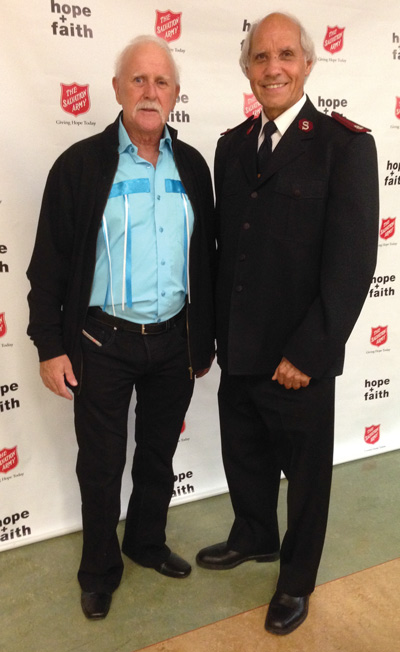But if you ask him, the real restoration work began the day he entered Harbour Light's detox centre, 15 years ago.
Search for a Higher Power
When Loree was younger, he lived with a “family of alcoholics” and it wasn't a surprise that he picked up the habit as he got older.
“I was never introduced to God back then,” he says. “Alcohol and drugs were my higher power for many years.”
After spending time in prison, hospital and treatment centres, Loree sobered up shortly before his son was born in 1984, though his wife continued drinking and using drugs. The couple eventually separated and Loree's son stayed with him. But when his son turned 14, he asked to return to live with his mother. Loree, feeling hurt and rejected, suffered a relapse. He was two months short of 15 years of clean time.
“When I let my son go, it was like the bottom dropped out of my life and I took a bad attitude about it,” he says. Loree ended up at the detox centre at Harbour Light.
It was there that Loree met other recovering addicts who had been in similar situations and talked with caring staff workers, such as the centre's former executive director, Major Sam Fame.
“At first, Bernie thought he knew it all in relation to his treatment because of all those years of clean time,” says Major Fame, who worked at Harbour Light for 15 years before he retired in 2006. “He was angry, obnoxious and trying to tell staff what to do.
“We extend lots of compassion on the one end to clients who want recovery, but we balance it with consequences, language an addict understands. When Bernie faced the reality of his need for help, he settled down.”
After detox, clients enter a three-month treatment program that includes group therapy, education and one-on-one counselling. On weekdays, clients share in a 15-minute devotional time led by another client, counsellor or staff member for encouragement. They are also required to participate in work therapy, where they provide daily meals to people on the street. Doing this encourages homeless individuals to consider getting help.
Clients graduating from the treatment program can then either move on or continue in the residential supportive care program for an additional three to 12 months. During this period, clients can apply to live at the centre's affordable housing complex and, with 10 to 12 months of clean time, clients can apply for a job at the centre. With treatment, affordable housing and job opportunities, maintaining ongoing recovery is far more achievable than without this continuum of care.
Blessings in Disguise
After 10 months in the program, Loree moved into Harbour Light's apartment complex and began working as a contractor for them, a job he has held ever since. A journeyman in the trades of carpentry, insulation and glazing, Loree is pleased that he lives and works in a place where his skills can benefit others.
“During the program, I began having an open mind about God and miracles started to happen—the obsession and compulsion to drink was lifted and it helped me to have faith that there really was something to this God.
“I look at all the nightmares I went through as blessings in disguise,” says Loree. “I know that all the things that went wrong in my life brought me to a place where I'd be willing to surrender to God.”
While at work and through speaking engagements at retreats and recovery groups, Loree has been able to find peace with his past and offer encouragement to those who feel like they can't turn their lives around. Another way Loree has contributed to Harbour Light is by serving meals as a volunteer on Christmas Day, a tradition he has kept since he arrived at the centre.
“I believe God has me where I can be of the most use,” he says. “At first, my past was a big nightmare—it wasn't a pretty sight. But I've been able to use that in a really positive way to help others by sharing my story.”
 Loree and Mjr Sam Fame at a fundraising gala for Harbour Light in October
Loree and Mjr Sam Fame at a fundraising gala for Harbour Light in October
Relationships That Last
Loree and Major Fame continued to keep in touch after his retirement. When Major Fame's daughter, who had volunteered at Harbour Light while dealing with health issues, passed away in 2009, Loree grieved with his friend.
“He was there to provide me with comfort and love and visited me at least once a month,” says Major Fame. “We talked a lot about faith and how that plays into our lives. Faith and recovery go hand in hand.”
Since his retirement, Major Fame has come across other former clients at churches who approach and update him on their recovery efforts. Sometimes that includes an apology for a relapse.
“I stop them right there and say, 'I'm not here to judge you. I'm just glad you picked up the pieces and are back on your journey,' ” he says. “Our hearts are welded in with the people at Harbour Light and behind every face, there's a story that people don't always see.
“We love the people—even when they falter or fail—we stand alongside them because, in many cases, we're their family.”
For Loree, the acceptance, love and forgiveness he experienced at Harbour Light changed his life.
“There were some vitally important ingredients in my recovery, starting with the unconditional love from staff and clients at Harbour Light,” says Loree. “Having a home group and sponsor, doing the steps and being involved in service work to give back also played a part, but on top of it all was my relationship with God.
“My prayers every night are for people who suffer—that they can reach a place where they're able to open their hearts to the love of God. If they're able to do that, they're going to be blessed in their lives as well.”










Leave a Comment